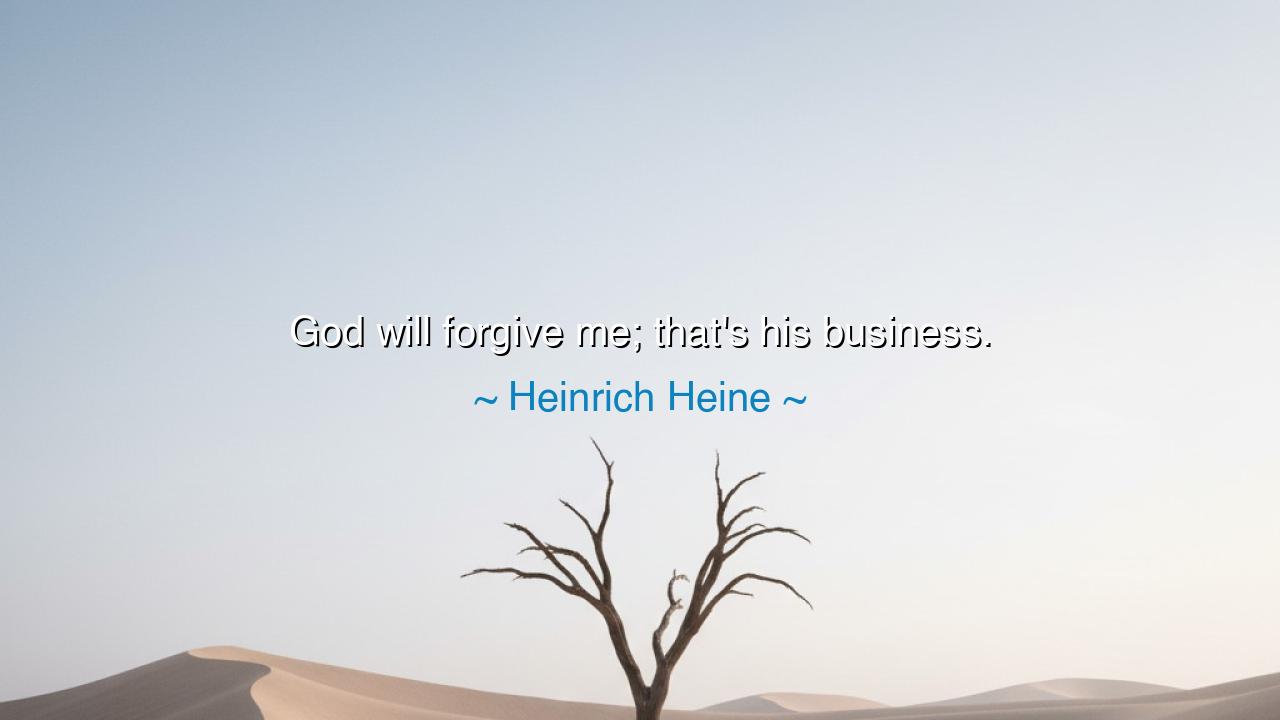
God will forgive me; that's his business.






Opening Scene – Narrated by Host
The room was quiet, with the soft glow of evening light filtering through the window. Jack sat on the couch, a book open in front of him, but his mind seemed far away. He wasn’t focused on the pages—his thoughts were instead on a quote he had come across earlier, one that seemed to carry a deep, almost rebellious weight. It wasn’t just about forgiveness—it was about the boundaries of human responsibility and divine grace.
Jeeny entered the room, a quiet presence, and set a cup of tea on the table beside Jack. She noticed the reflective look on his face and sat down across from him, waiting for him to speak.
Jeeny: “You seem lost in thought. What’s on your mind?”
Jack looked up, blinking as he came back to the present. He smiled faintly before speaking.
Jack: “I was thinking about something Heinrich Heine said: ‘God will forgive me; that’s his business.’ It made me reflect on the idea of forgiveness—not just from a spiritual perspective, but in how we view accountability and grace. It almost feels like a statement of surrender, as if Heine is acknowledging that, at the end of the day, our mistakes are ultimately between us and a higher power.”
Jeeny’s expression softened, and she wrapped her hands around her tea cup, considering the meaning behind the words.
Jeeny: “That’s an interesting perspective. It sounds almost like Heine is saying that forgiveness, especially divine forgiveness, is beyond human control. We can’t dictate how or when we’re forgiven—that’s not for us to decide. All we can do is recognize our faults, seek reconciliation, and leave the rest to God. It’s about humility, acknowledging that some things are out of our hands.”
Jack: “Exactly. It’s like Heine is saying that the act of forgiveness, especially from God, doesn’t belong to us. It’s not something we can measure, control, or demand. It’s part of a larger divine plan, and it’s not about us fixing everything on our own. In a way, Heine’s words release us from the weight of perfection—because we’re not the ones who have to forgive everything, or at least, not all the time.”
Host: The conversation deepened, and Jack and Jeeny began to explore the concept of forgiveness not just from a moral or religious perspective, but as a means of recognizing the limits of human responsibility. Heine’s words hinted at the tension between human accountability and divine grace, between what we can control and what is ultimately left to something greater than ourselves.
Jeeny: “I think there’s also something freeing in that. If we constantly hold ourselves accountable for everything, never allowing space for grace or forgiveness, we might never move forward. Heine’s statement suggests that, while we have a role in seeking forgiveness or reconciling with others, there’s also a higher power that oversees the ultimate judgment. It allows us to stop holding on to guilt or regret for things that might be beyond our ability to control.”
Jack: “Right. It’s not about ignoring accountability—it’s about recognizing that sometimes, we can’t carry all the weight of our actions. Sometimes, we need to trust that there’s a bigger plan at play, that we don’t have to shoulder every burden ourselves. God’s forgiveness is His domain, and while we can strive to be better, we don’t have to fix everything on our own.”
Jeeny: “And maybe that’s where grace comes in. It’s not about us being perfect, but about recognizing our imperfection and accepting that we’re human. We can’t erase every mistake, but we can ask for forgiveness and trust that it’s not our job to carry that burden forever. We do our part, and the rest is left to something greater.”
Host: Jack nodded, a sense of clarity settling in. He realized that Heine’s words were not a dismissal of responsibility, but rather a recognition of the larger picture. Human mistakes were inevitable, but forgiveness, especially divine forgiveness, was something beyond our control. It was a process that required humility and trust, acknowledging that grace could not always be earned, but was ultimately part of a divine plan.
Jack: “So, maybe the lesson is that we don’t have to carry the weight of everything. Yes, we need to be accountable for our actions, but there’s also grace in knowing that forgiveness is not something we can force—it’s something that, in the end, belongs to God.”
Jeeny: “Exactly. It’s about accepting that some things are beyond our control. We can seek reconciliation, we can try to make amends, but ultimate forgiveness is not for us to demand. It’s about trusting the process, and trusting that grace will be there when we need it.”
Climax and Reconciliation
The room felt quieter now, as Jack and Jeeny reflected on the deeper meaning behind Heine’s words. Outside, the world continued its steady rhythm, but inside, they had discovered something important: forgiveness was not just about personal responsibility—it was about understanding the limits of human control and embracing the grace that came from something greater. Heine’s words reminded them that while we strive to make things right, the ultimate act of forgiveness was beyond us, and that allowed room for peace, healing, and growth.
Jack: “So, it’s about balance—doing what we can, but also knowing that some things are in a higher power’s hands. It’s not all on us.”
Jeeny: “Exactly. We do our part, but we also make space for grace. We can’t fix everything, but we can trust in forgiveness—both from others and from God.”
Host: The conversation settled into a quiet understanding. Forgiveness wasn’t just a human act—it was a divine one as well. And by accepting that, they could find peace in knowing that not everything was theirs to fix.






AAdministratorAdministrator
Welcome, honored guests. Please leave a comment, we will respond soon